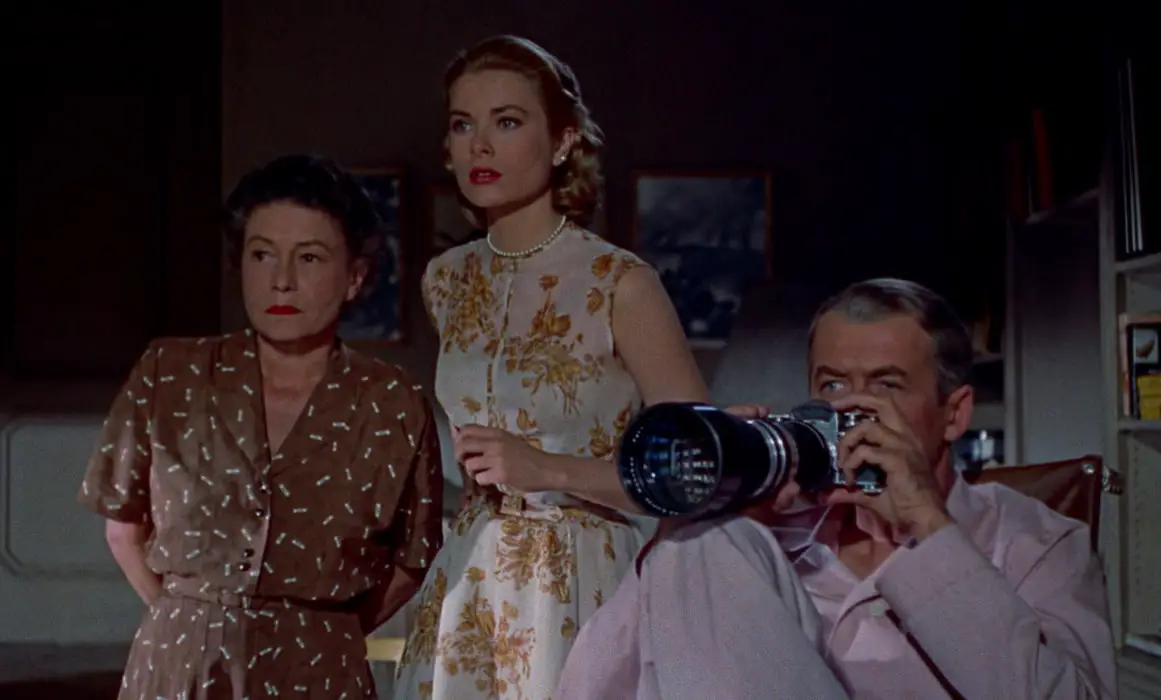
The Oscar-nominated Rear Window isn’t just one of Alfred Hitchcock’s best films but one of the greatest thrillers ever made.
I was late to watching Hitchcock films for the most part. Up until the pandemic, Rear Window and North by Northwest were probably among the few Hitchcock films that I’ve watched. But even then, I put off Psycho for several years with the thought that it was a horror film and not a psychological thriller. And while I’ve yet to press play on The Birds, I’ve come to appreciate Hitchcock for the master of suspense that he is. What surprises me on this rewatch is how tame it is for a suspense thriller. In any event, the film holds up quite well.
John Michael Hayes bases his script on a Cornell Woolrich short story, “It Had To Be Murder.” Since the short story does not have a romantic angle, they add this for the film. Regarding Grace Kelly’s Lisa, Hayes draws on both Kelly and his wife in writing for the character. It’s a shame that none of the actors earn Oscar nominations because Hitchcock is directing the hell out of the picture. Both Hitchcock and Hayes earn Oscar nominations for directing and screenwriting, respectively. They are joined by nominations for Cinematography – Color and Sound Recording.
In a perfect universe, the Academy would also have nominated the film’s production design. They manage to build an entire Greenwich Village courtyard on a single soundstage. It’s one of the most impressive sets that has ever graced the screen. How often do they take the floor out of the soundstage?!? Basically, the set is going from the bottom of the basement to the grips. Stewart’s apartment is at stage floor level. On top of this, they had to feature lighting for morning, afternoon, twilight, and nighttime. It certainly saves some time with lighting the set because they don’t have to change with each set-up. Unfortunately for filmmakers, the small apartment means being cramped during filming, especially with the wide-angle lenses.
L. B. “Jeff” Jefferies (James Stewart) has been sitting six weeks in a two-room apartment with nothing to do but look out the window. It’s a concept that we’ve seen time and time again. Most recently, the concept was also spoofed in The Woman in the House Across the Street From the Girl in the Window. In any event, looking out the window is the only thing giving him life during the heat weave, aside from girlfriend Lisa Fremont (Grace Kelly) visiting up. Stella (Thelma Ritter) brings a lot of humor to the film as Jeff’s nurse.
There are a number of characters living across the street. We do not really get to know them but Jeff gives them something of an identity with their names using the male gaze, of course. Salesman Lars Thorwald (Raymond Burr) is the one that Jeff keeps coming back to the most. His wife, Anna (Irene Winston), is bedridden. Anyway, Jeff comes to the conclusion that Lars has murdered his wife based on suspicious behavior. Lisa and Stella start believing Jeff when they see Lars behaving in a way that would draw suspicions. Jeff calls up a friend from the war, NYPD detective Tom Doyle (Wendell Corey). Doyle finds nothing out of the ordinary, believing that Thorwald’s wife is upstate.
Lisa and Stella take matters into their own hands, digging up a flower bed to find nothing. However, Lisa breaks into the apartment and finds an empty handbag. She does manage to find a wedding band, which no married woman would have taken off their hand when traveling. It’s not until the film’s climax that we learn the truth: Thorwald did murder his wife–he only confesses after breaking into Jeff’s apartment and nearly kills him. The film finishes with Jeff in casts on both legs and Lisa reading a fashion magazine.
The film deals with a number of themes: voyeurism, guilt, sexuality, etc. It’s one of the finest Hitchcock films and in using the subjective point of view, it’s the best use of his filmmaking. Stewart’s Jeffries doesn’t even have to mouth a word and Hitchcock places the audience in his mind. Back to the voyeurism for a moment, Stella doesn’t let Jeff off the hook for his actions.
In terms of score, Franz Waxman’s contributions are rather minimal in his fourth and final Hitchcock score. He only scores the opening and end titles along with a piano tune for Lisa. Instead of featuring a traditional score, Hitchcock depends on everyday activities–radio, piano playing, record players–to provide the thriller’s soundtrack. Basically, the only music heard is if it’s also being heard throughout the courtyard. It’s unusual for a film but Hitchcock’s filmmaking style makes it work in Rear Window.
As Rear Window approaches its 70th anniversary, it remains one of the greatest thrillers to grace the screen.
DIRECTOR: Alfred Hitchcock
SCREENWRITER: John Michael Hayes
CAST: James Stewart, Grace Kelly, Wendell Corey, Thelma Ritter, with Raymond Burr, Judith Evelyn, Ross Bagdasarian, Georgine Darcy, Sara Berner, Frank Cady, Jesslyn Fax, Rand Harper, Irene Winston, Havis Davenport
Paramount released Rear Window in theaters on September 1, 1954. Grade: 5/5
Please subscribe to Solzy at the Movies on Substack.




